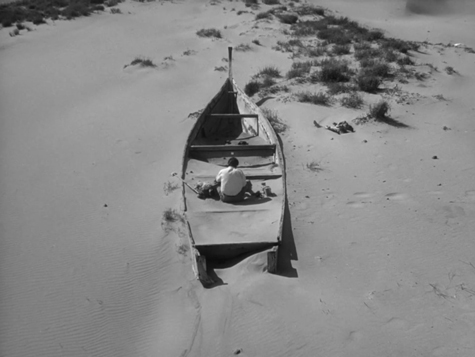WOMAN IN THE DUNES
(1964, Teshigahara)
A film from the 1960s

"Make the sand work for you, not against you."
That is one of the advices that Junpei (Eiji Okada) gives the titular "woman in the dunes" (Kyōko Kishida) as they ponder about the possibilities given their current situation. You see, they are both trapped in a sand pit and forced by local villagers to work by shoveling sand so the village can survive. The woman, who has been there longer than Junpei, has already accepted her fate, but Junpei holds on to "hope... that things will change tomorrow". But will things change? can things change? or is it us that have to change?
That seems to be one of the statements made by this 1964 Japanese New Wave film; not that it offers any concrete conclusion, but it does put forth that clash between freedom and free will, "rigid thinking" and adaptation, and also complacency. The film puts the lead characters in a situation that seems hopeless, as their respective prospects of life clash. Junpei doesn't want this change as he longs to return to civilization, but in rejecting it, isn't he as "trapped" as his companion?
In the opening scene, Junpei, who is a schoolteacher and entomologist, visits the desert looking for insects, which in turn leads him to his capture. There's an interesting juxtaposition as we see him trap insects that he puts in a bottle, only to have him being trapped and "put into a bottle" himself. The difference being perhaps in the practicality of one vs. the other. The former, he does more as a "hobby", while the latter is done to maintain the village's lifeline. One could certainly argue the ethical and moral implications of both, but as time passes, Junpei rejects his past hobby in favor of practicality (see the scene where he gets rid of his insects in order to please/help the woman).
Having just finished this film a couple of hours ago, I certainly have a dozen thoughts in my head about both its raw story as well as all its symbolisms, and it certainly seems like a film that will stick in my mind for a long time. The way it balances a story that's mysterious, intriguing, tragic and sad, with messages of isolation, identity, life purpose, sexuality, and primal instincts is simply marvelous.
But it doesn't stop with the story. The film is also impressive from pretty much every other aspect. The performances from Okada and Kishida are pretty much flawless, as we see them shift and change like the sand; the score by Toru Takemitsu goes from subtle to harsh in a fluid, seamless way; director Hiroshi Teshigahara and cinematographer Hiroshi Segawa make great use of the camera, using both wide shots and closeups to convey different emotions. The nature shots of the dunes and their shifting sands also add a lot to what the film is trying to tell us: much like that sand, things in life can change slowly or they can change suddenly. The key is how we react and adapt to whatever change comes, and make the sand work for us.
Grade:

 Check out my podcast:
Check out my podcast: 

 and I can't remember what I picked for Thursday? Cricket what did I pick for her?
and I can't remember what I picked for Thursday? Cricket what did I pick for her?